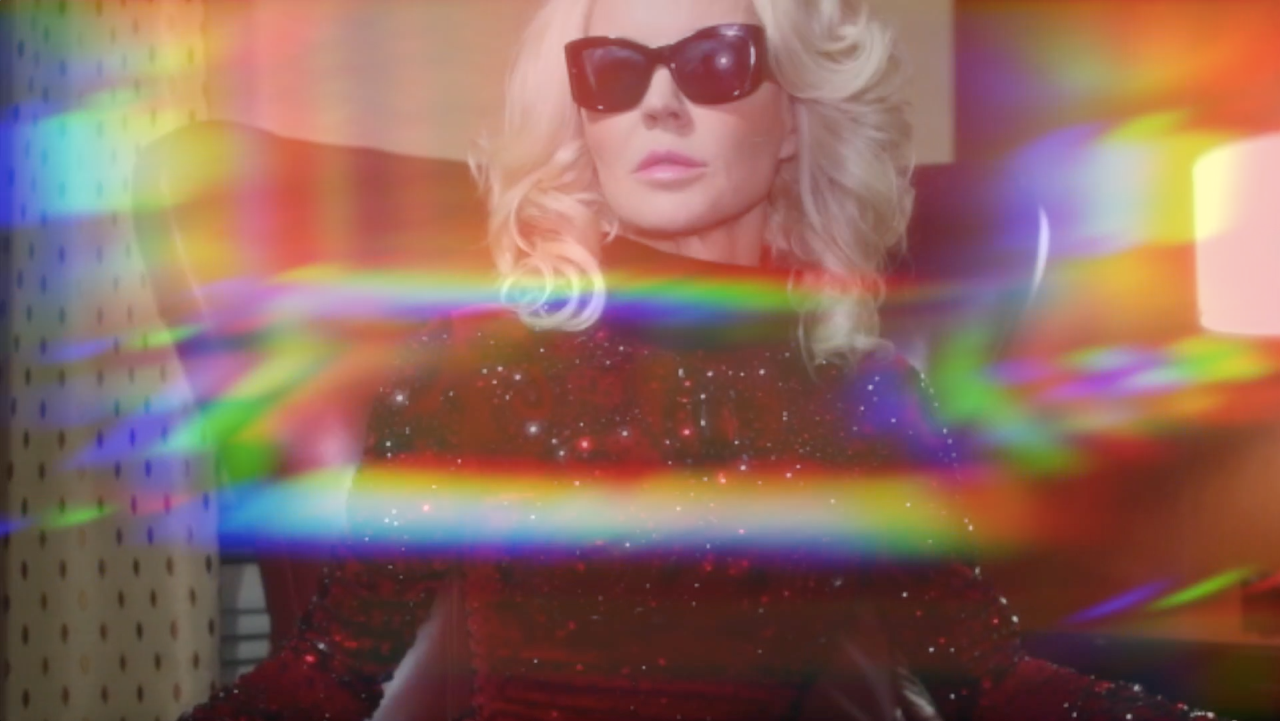Following her 2016 musical debut with Optimist in Black, Daphne Guinness has begun to slowly unveil a series of songs which reveal a changing sound; what was previously melancholy now has a thick undercurrent of rock and roll. Her sophomore album, Daphne and the Golden Chord, is set for release this spring. Her latest video, “Electric Consciousness,” won’t be on the album (“It’s good to put out bonus tracks, just for fun,” she says with a shrug and smile), but it’s a good sonic preview of what’s to come.
Directed by frequent collaborator Joe Lally and featuring a cameo by New York design duo The Blonds, “Electric Consciousness” has a glamorous-yet-eerie Lynchian vibe as Daphne traipses around a darkly lit hotel room in sequins and feathers. It’s the most visually opulent music video since her first, the David LaChapelle-directed “Evening in Space” — not coincidentally, perhaps, as LaChapelle’s fantastical film served as her first introduction to The Blonds. Daphne wears one of the duo’s creations for the video’s opening shot.
Below, Daphne talks to i-D about her Alice in Wonderland inspirations, working with legendary David Bowie producer Tony Visconti, and how her art is finally mirroring her life.
What’s the message of “Electric Consciousness”?
I had this vision of Alice, drinking the bottle and being very small. Altered states of being. It’s also to do with being lost; if you suddenly got sucked down into an electric current, and not being able to find your way out, like in Tron.
How did you meet The Blonds?
I met them through Joe [Lally]. I connected with them very quickly, and then it turned out that the only thing that wasn’t mine in “Evening in Space,” was one catsuit. It was the only thing I’d worn that I didn’t know who made it — it was by The Blonds! It turned out that me and Phillipe are exactly the same size, so that was really funny. And then we did the video. It’s really great, it’s really Joe. He’s an alien. He’s magic.
You’re also continuing to work with Tony Visconti, who produced your last record, but these new songs feel different, more upbeat.
Daphne and the Golden Chord is definitely more upbeat. The idea in my head was: Tony’s so great, but what does he excel at? And that’s glam rock. So, why not get him to do a glam rock album? He invented the genre, practically. To make him do a new wave album would be silly. And I wanted to play to his strengths. He’s a very well-rounded producer, but what albums did I love of his? What did I want to learn from him?
What albums of his did you love?
I loved the albums that he did with Marc Bolan, and I loved [Bowie’s] Berlin Trilogy, Low, Heroes, Lodger… and Scary Monsters, obviously. That was a big one. That was a great album. [Tony] is very creative with his sound bank. He thinks outside of the box, for sure. He built the box in the first place. His string arrangements are quite extraordinary. He leaves the gaps. It can be mystifying for a rock and roll band to hear the spaces that he leaves during the recordings, but he’s already hearing what he’s going to put in. After doing the first album and getting to know him and getting to know the way he worked, I kind of just wanted more and more strings.
The title alone, Daphne and the Golden Chord , seems to signal a positive shift, moving from “black” to “golden.” Do you feel more hopeful with this record?
Definitely, the music is for sure more optimistic. It’s been a lot more fun, too. Not that Optimist in Black wasn’t a lot of fun to record, but the things I was talking about on the first album were things that had happened in the not so distant past. Now, it’s becoming more immediate; things are happening as I’m writing. So I’m not really exploring old dramas. It’s a new chapter. My art has caught up with my life.
Why record in analog?
I like mistakes in records. I don’t like them to be perfect. I don’t want too much perfection; that’s not what I’m aiming for. It feels too homogenized. With analog, you’re trying to capture the moment of a real performance.
Do you consider that while you’re writing the songs? Does it affect your process?
No. But I wouldn’t want to record any other way. For me, that part of the process is because I like to make things weird and difficult. I want to actually learn something. And there’s only so much the computer programming that is interesting to me. I actually really like to hug my compressor, I like to have my microphone and stroke it. I think they’re beautiful things, and I feel sad when I see that it’s all so simple; just a computer program. Wave forms. I want to feel like I’m in a space machine.
